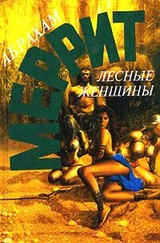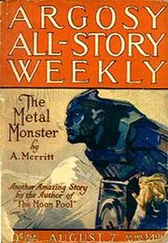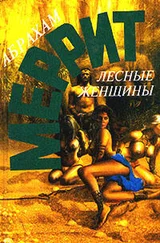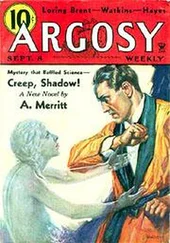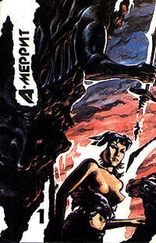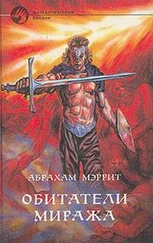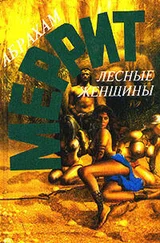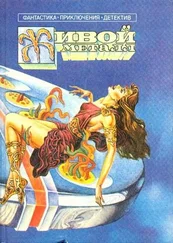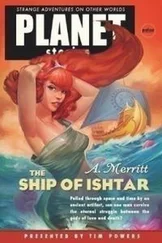"In the chamber next this, Lord."
"It would be better if you and the others slept here, Dara. There are half a dozen rooms for you. Have wine and food brought for you—plenty of it."
She laughed.
"Do you expect a siege, Dwayanu?"
"One never knows."
"You do not greatly trust Lur, Lord?"
"I trust her not at all, Dara."
She nodded, turned to go. Upon the impulse I said:
"Dara, would it make you sleep better to–night and those with you, and would it help you in picking your guard if I told you this: there will be no more sacrifices to Khalk'ru while I live?"
She started; her face lightened, softened. She thrust out her hand to me:
"Dwayanu—I had a sister who was given to Khalk'ru. Do you mean this?"
"By the life of my blood! By all the living gods! I mean it!"
"Sleep well, Lord!" Her voice was choked. She walked away, through the curtain, but not before I had seen the tears on her cheeks.
Well, a woman had a right to weep—even if she was a soldier. I myself had wept to–day.
I poured myself wine, sat thinking as I drank. Mainly my thoughts revolved around the enigma of Khalk'ru. And there was a good reason for that.
What was Khalk'ru?
I slipped the chain from round my neck, opened the locket and studied the ring. I closed it, and threw it on the table. Somehow I felt that it was better there than over my heart while I was doing this thinking.
Dwayanu had had his doubts about that dread Thing being any Spirit of the Void, and I, who now was Leif Langdon and a passive Dwayanu, had no doubts whatever that it was not. Yet I could not accept Barr's theory of mass hypnotism—and trickery was out of the question.
Whatever Khalk'ru might be, Khalk'ru—as the Witch–woman had said—was. Or at least that Shape which became material through ritual, ring and screen—was.
I thought that I might have put the experience in the temple of the oasis down as hallucination if it had not been repeated here in the Shadowed–land. But there could be no possible doubt about the reality of the sacrifice I had conducted; no possible doubt as to the destruction—absorption—dissolvement—of the twelve girls. And none of Yodin's complete belief in the power of the tentacle to remove me, and none of his complete effacement. And I thought that if the sacrifices and Yodin were standing in the wings laughing at me, as Barr had put it—then it was in the wings of a theatre in some other world than this. And there was the deep horror of the Little People, the horror of so many of the Ayjir—and there was the revolt in ancient Ayjirland born of this same horror, which had destroyed Ayjirland by civil war.
No, whatever the Thing was, no matter how repugnant to science its recognition as a reality might be—still it was Atavism, superstition—call it what Barr would—I knew the Thing was real! Not of this earth—no, most certainly not of this earth. Not even supernatural. Or rather, supernatural only insofar as it might come from another dimension or even another world which our five senses could not encompass.
And I reflected, now, that science and religion are really blood brothers, which is largely why they hate each other so, that scientists and religionists are quite alike in their dogmatism, their intolerance, and that every bitter battle of religion over some interpretation of creed or cult has its parallel in battles of science over a bone or rock.
Yet just as there are men in the churches whose minds have not become religiously fossilized, so there are men in the laboratories whose minds have not become scientifically fossilized…Einstein, who dared challenge all conceptions of space and time with his four dimensional space in which time itself was a dimension, and who followed that with proof of five dimensional space instead of the four which are all our senses can apprehend, and which apprehends one of them wrongly…the possibility of a dozen worlds spinning interlocked with this one…in the same space…the energy which we call matter of each of them keyed to the different vibration, and each utterly unaware of the other…and utterly overturning the old axiom that two bodies cannot occupy the same place at the same time.
And I thought—what if far and far back in time, a scientist of that day, one of the Ayjir people, had discovered all that! Had discovered the fifth dimension beyond length, breadth, thickness and time. Or had discovered one of those interlocking worlds whose matter streams through the interstices of the matter of ours. And discovering dimension or world, had found the way to make dwellers in that dimension or that other world both aware of and manifest to those of this. By sound and gesture, by ring and screen, had made a gateway through which such dwellers could come—or at least, appear! And then what a weapon this discoverer had—what a weapon the inevitable priests of that Thing would have! And did have ages gone, just as they had here in Karak.
If so, was it one dweller or many who lurked in those gateways for its drink of life? The memories bequeathed me by Dwayanu told me there had been other temples in Ayjirland besides that one of the oasis. Was it the same Being that appeared in each? Was the Shape that came from the shattered stone of the oasis the same that had fed in the temple of the mirage? Or were there many of them—dwellers in other dimension or other world—avidly answering the summons? Nor was it necessarily true that in their own place these Things had the form of the Kraken. That might be the shape, through purely natural laws, which entrance into this world forced upon them.
I thought over that for quite awhile. It seemed to me the best explanation of Khalk'ru. And if it was, then the way to be rid of Khalk'ru was to destroy his means of entrance. And that, I reflected, was precisely how the ancient Ayjirs had argued.
But it did not explain why only those of the old blood could summon—
I heard a low voice at the door. I walked softly over to it, listened. I opened the door and there was Lur, talking to the guards.
"What is it you are seeking, Lur?"
"To speak with you. I will keep you only a little time, Dwayanu."
I studied the Witch–woman. She stood, very quietly, in her eyes nothing of defiance nor resentment nor subtle calculation—only appeal. Her red braids fell over her white shoulders; she was without weapon or ornament. She looked younger than ever I had seen her, and somewhat forlorn. I felt no desire to mock her nor to deny her. I felt instead the stirrings of a deep pity.
"Enter, Lur—and say all that is in your mind."
I closed the door behind her. She walked over to the window, looked out into the dim greenly glimmering night. I went to her.
"Speak softly, Lur. The girl is asleep there in the next chamber. Let her rest."
She said, tonelessly:
"I wish you had never come here, Yellow–hair." I thought of Jim, and I answered:
"I wish that too, Witch–woman. But here I am." She leaned towards me, put her hand over my heart. "Why do you hate me so greatly?"
"I do not hate you, Lur. I have no hate left in me—except for one thing."
"And that—?"
Involuntarily I looked at the table. One candle shone there and its light fell on the locket that held the ring. Her glance followed mine. She said:
"What do you mean to do? Throw Karak open to the dwarfs? Mend Nansur? Rule here over Karak and the Rrrllya with their dark girl at your side? Is it that…and if it is that—what is to become of Lur? Answer me. I have the right to know. There is a bond between us…I loved you when you were Dwayanu…you know how well…"
"And would have killed me while I was still Dwayanu," I said, sombrely.
"Because I saw Dwayanu dying as you looked into the eyes of the stranger," she answered. "You whom Dwayanu had mastered was killing Dwayanu. I loved Dwayanu. Why should I not avenge him?"
Читать дальше
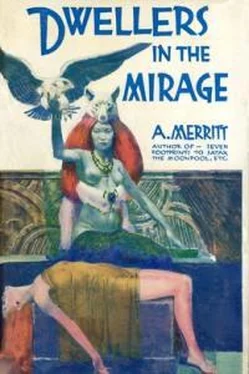
![Абрахам Меррит - Лунный бассейн [Лунная заводь]](/books/20623/abraham-merrit-lunnyj-bassejn-lunnaya-zavod-thumb.webp)
